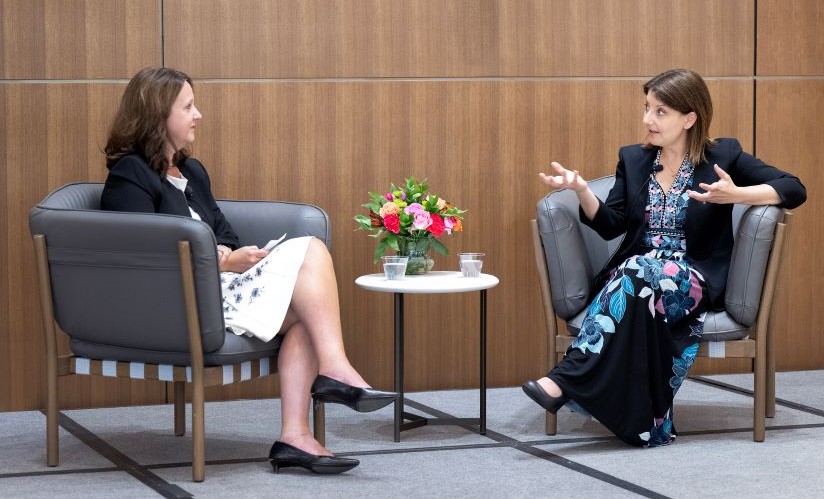CDC Director Shares Vision for Future of Public Health

In the wake of the COVID-19 pandemic, public health is entering a new chapter—one that requires change. That’s the state of mind Centers for Disease Control and Prevention (CDC) Director Mandy Cohen, MD, shared with Dean M. Daniele Fallin, PhD, during an April 17 fireside chat at the Rollins School of Public Health.
The event—sponsored by the CDC Employee Association of Emory Alumni, which represents the over 1500 Emory alums currently working at CDC—brought together these two public health leaders to discuss their shared vision for the future.
Cohen outlined how CDC is responding to the evolving public health climate, including four focus areas for 2024:
- being ready to respond to any health threat,
- improving mental health,
- supporting young families, and
- workforce development.
Preparedness and Response
Cohen emphasized the importance of being “disease agnostic” in preparedness and response efforts. That means strengthening current systems and infrastructure to be able to respond equally well to any disease threat, including:
- Building interconnected data systems that can give a clear understanding of what is happening in communities and health care.
- Having the necessary lab infrastructure to detect emerging health threats.
- Developing a talented workforce that has the capability to respond to health threats.
Improving Mental Health
Fallin and Cohen share a passion for and commitment to improving public mental health. At CDC, this includes a focus on youth mental health. This year, they are launching an action guide that equips educators with evidence-based best practices for supporting the mental health needs of their students. CDC is also promoting best practices for overdose interventions, such as connecting people with peer supports in the hospital after non-fatal overdoses.
Supporting Young Families
Mental health is also a focus when it comes to CDC supporting young families, as Cohen acknowledges that maternal mental health crises are a leading cause of maternal mortality. She also highlighted the importance of supporting the health of every member of the family, from pregnant women, to parents, to children. She shared that “lifelong patterns of health start early,” and that is a driving idea behind CDC’s programs that support children’s health.
Workforce Development
When reflecting on future directions of public health, Cohen stated that it is important to consider “how we turn science into action.” That means investing in a workforce with strong skills in implementation and effective communication.
CDC is prioritizing health communications as a vital skill for the public health workforce and recognizes that the way the public consumes information is always evolving. That is why they turn to institutions like Rollins to continue to educate and develop future public health professionals, from communicators, to data scientists, and everything in between.